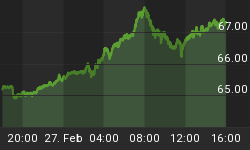Gold plus Gaddafi - what more sexing up could a story need? Well, quite a bit it would seem...
EVEN Alan Greenspan knows that gold is always and everywhere about economic freedom.
This isn't a moral point, just a fact. So sometimes, as we told the BBC World Service on Tuesday, it plays to the good of dictators; sometimes it plays to private individuals in terms of personal liberty.
Gold enabled Great Britain, for instance, to buy arms and food from the United States during the first two years of WWII. The Pound Sterling's survival was by no means secure, whereas gold bullion - as Sir Alan of Greenspan reminds us - is "the ultimate form of payment in the world."
Four decades later, sanctions-busting sales of the Krugerrand helped finance South Africa's apartheid regime, bagging 89% of the world's gold-coin market by 1980. Whereas today, the public in Vietnam is hoarding gold to try and survive the Communist regime's repeated devaluations of the Dong currency - a defense most expertly played by Indian households since long before India relaxed its tight controls on legal gold trading two decades ago.
So what to make of this little fuss...quietly building since last week...about Mad Dog Gaddafi's hoard of central-bank gold bullion in Libya? Follow only the gold-bug blogs, and you might think the Financial Times kicked off the idea on Monday night. It claimed that Gaddafi will/might/maybe-could finance his mercenary army by giving them gold straight out of Libya's 143.8-tonne central bank hoard.
Gold plus Gaddafi - what more sexing up could a story need? Yet a bigger and bolder claim was in fact made, and in the name of bombing Tripoli too, four days before.
"Gaddafi remaining in power will be a destructive and destabilising force throughout the Arab world," wrote British lord David Owen in The Daily Mirror last Friday. "[Gaddafi] has amassed considerable undeclared gold reserves and he will use that money to create trouble not just for immediate neighbours but further afield."
Oh, has he now, and will he indeed?
A handful of diplomats have claimed in the past that Gaddafi wanted to build WMDs. But gold reserves of mass destruction? No one we've checked with knows where Lord Owen might have got such certainty (and we checked with a few). Short of Owen actually being Gaddafi's agent in the market - as one wag joked to me today - it's quite the claim.
Yes, there have been rumors about Libya buying gold and not declaring its new reserves for many years, but nothing has ever been substantiated. Gold's unofficial "black market" is widely accepted as huge, and Philip Klapwijk of the GFMS consultancy reckons central-bank reserves worldwide might stand 10% above the officially-stated total, currently put at 27,220 tonnes.
What's more, Libya was exporting 1.6 million barrels of oil per day ahead of the rebellion, and it's hard to imagine Gaddafi keeping all of that cash in Dollars. Yet his central bank's reported gold reserves haven't changed since 1998, long before Tony Blair shook his hand and - quite coincidentally - the man convicted of the Lockerbie Bombing was set free.
So maybe Lord Owen is in the know, with the CIA or Tripoli itself choosing to tip-off the 73-old peer. There's nothing in the public domain to confirm or support his assertion, and there's nothing (yet) on WikiLeaks. But either way, here is Owen, the grand old man (or "mountebank" as Michael Foot called him) of British diplomacy using Libya's unknown and unknowable gold hoard to urge that very same 'liberal intervention' in the desert which took us to Kandahar and Basra...the very same kind of choosing sides which he himself tip-toed around at the cost of 100,000 lives in the early 1990s Bosnian War.
Make no mistake: Gold, just like David Owen, is always a political beast. But gold doesn't pick winners and it doesn't claim to know right from wrong. Owning it gives you freedom from external control, be it inflation or UN sanctions. Gold doesn't make your cause just, but it certainly doesn't make you bad by association. Not yet.
"Iran has bought large amounts of gold in the international market, according to a senior Bank of England official, in a sign of how growing political pressure has driven Tehran to reduce its exposure to the US Dollar..."
So said the Financial Times on Sunday night - more than three days after Lord Owen filed his copy to The Mirror, and one day before the FT itself began talking up the Mad Dog's gold-payments idea. A cable dated June 2006 shared with the paper by WikiLeaks (which wants "to keep government open" in its own words, and with no hint of self-awareness or irony) apparently records the Bank of England's head of banking telling a US official that "significant moves by Iran to purchase gold" had been observed - "an attempt by Iran to protect its reserves from risk of seizure."
Prompted by such news, one or other un-named "market" source then made so bold as to tell the FT that "Tehran has been one of the biggest buyers of bullion over the past decade after China, Russia and India, and is among the 20 largest holders of gold reserves.
"They estimate it holds more than 300 tonnes of gold, up from 168.4 tonnes in 1996, the date of the most recent International Monetary Fund data."
In the attention-deficit final analysis that passes for news today, "Gold key to financing Gaddafi struggle," as the FT's other mad-regime bullion article is headlined. Libya's hoard is "enough to pay mercenaries to fight for him for years," says the Sydney Morning Herald.
Gold is for bad guys, in short. I read it in the newspapers.















